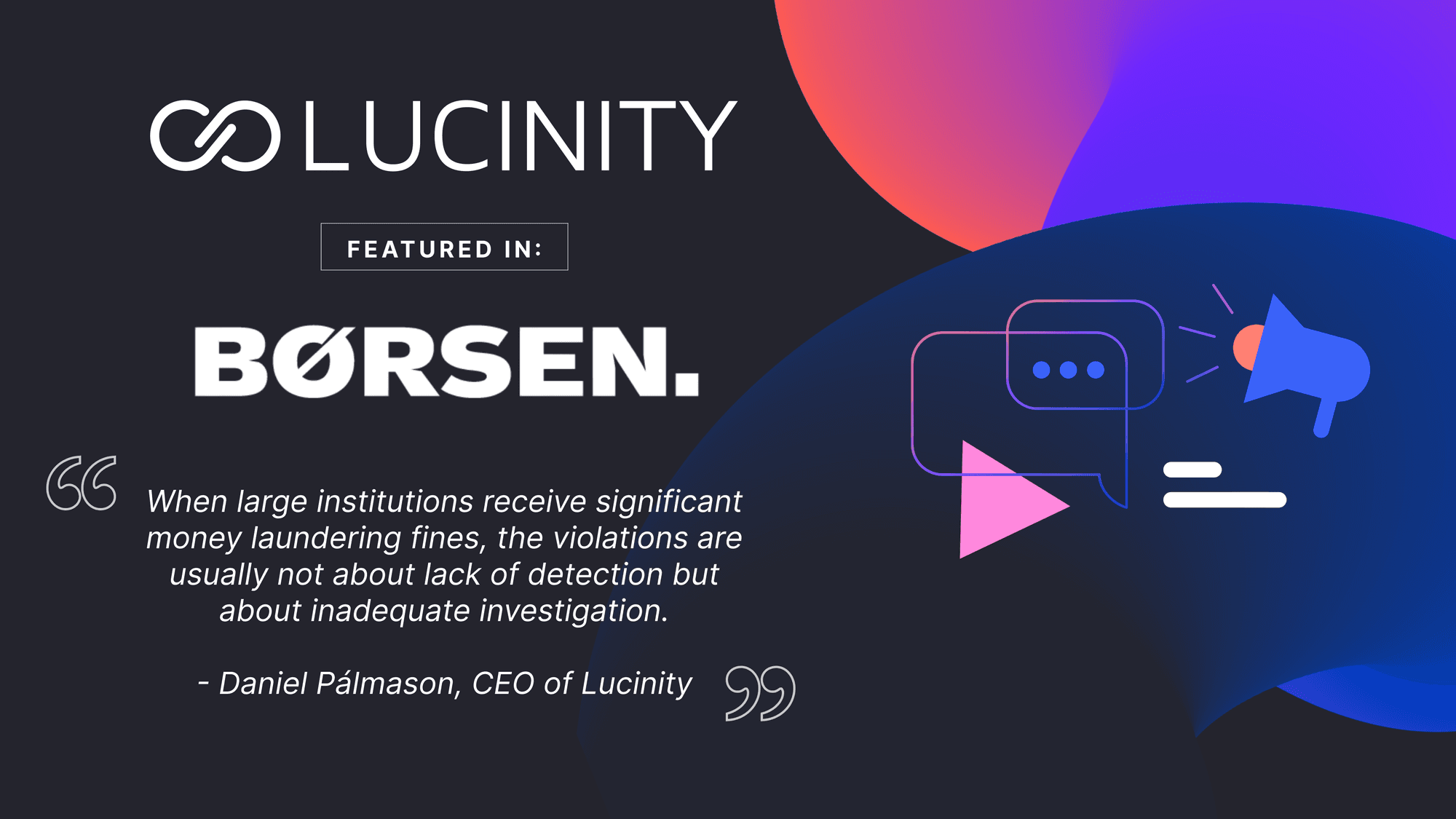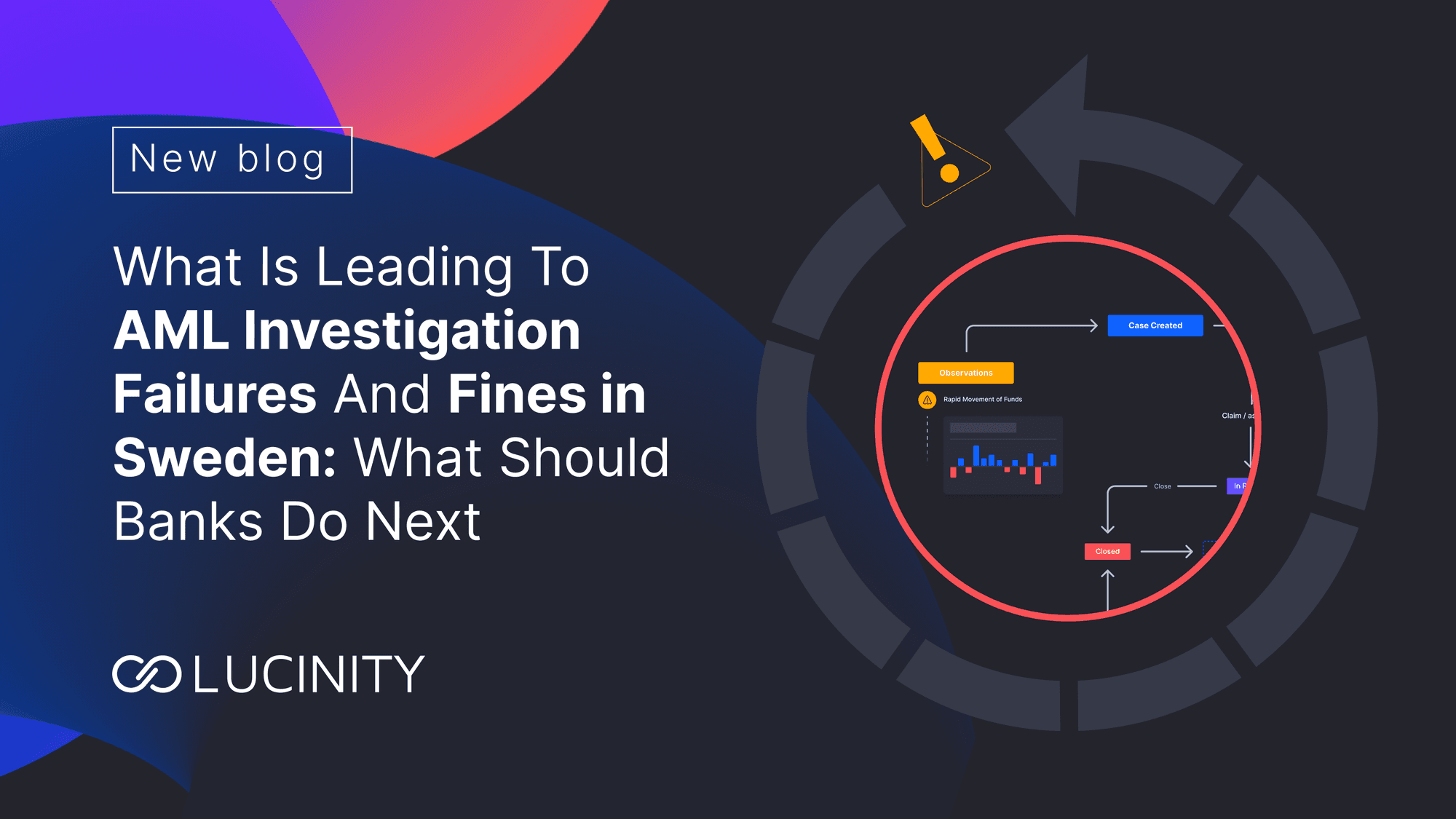Lucinity’s 7 Principles for Designing Self-Service and Configurable Compliance Software
Explore how Lucinity's seven product design principles for self-service and configurability are setting new standards in FinCrime Prevention, offering unprecedented flexibility and user experience.
In this blog, I’d like to introduce our product team’s principles for designing compliance software that enables our users to be as autonomous and efficient as possible. At the forefront of our product philosophy is the recognition that each financial institution is unique, necessitating a system that is both comprehensive and configurable.
At Lucinity, we aim to deliver software that can help your team meet regulatory obligations, support your compliance workflows, and deliver the insights needed by each team and user. We design for self-service and configurability right from the start, so that Lucinity can cater to your compliance needs today and as they change in the future.
1. Configuring the System for Different Companies
Lucinity’s approach to self-service is rooted in the understanding that no two companies are the same. This principle is about offering unparalleled flexibility for financial institutions, allowing them to configure the Lucinity platform to their unique operational needs and preferences. For instance, two of Lucinity’s clients, Currencycloud and Pleo, while both requiring robust financial crime monitoring and investigation tools, operate with distinct team structures and processes. Lucinity’s platform enables such diverse entities to configure their own views, workflows, and the specific information they need to see, ensuring that Lucinity is able to meet their compliance requirements.
This level of customization means that the system can be fine-tuned to support various team sizes, team structures, and procedural frameworks. By placing the control in the customers' hands, Lucinity ensures that its solutions are both powerful and remarkably adaptable. This provides a seamless experience that supports each company's unique way of working.
2. Configuring the System to Be Tailored to Your Processes
Self-service in SaaS platforms is now expected, yet Lucinity elevates this feature by providing administrative users with the ability to configure and set up the platform in a way that matches their internal workflows. This approach recognizes and supports the variety of workflow methods and data management requirements. Lucinity also brings a high level of configurability options, from crafting workflows to designing the display of data and insights.
As opposed to conventional customization that changes appearance, configurability adjusts the software's underlying behavior, aligning it strategically to your specific use case. So, configurability allows for adapting the platform's function and form based on a company's unique operational structure, workflows, and data management requirements.
3. Configuring the System for Different Users
The diversity in user roles and responsibilities within financial crime investigation teams demands a system that can offer a personalized experience to every user. Lucinity's principle of user-specific configuration addresses this need by providing customizable views and functionalities to different user groups. These cater to the varying requirements of administrators versus users, and even among users themselves, depending on their role in the investigation process.
This configurability extends to the level of individual preferences and job functions, allowing users to see only what is relevant to their specific tasks and responsibilities. For instance, a level 1 investigator might need a simplified view focusing on initial alert assessments, while a level 2 investigator requires detailed information for in-depth case analysis. Furthermore, each individual investigator may want to change their view and adjust the columns and filters they would like to use.
Lucinity’s platform facilitates this level of configurability, ensuring that each user's interface is optimized for their role, enhancing both the user experience and the efficiency of the investigative process.
4. Designing with User Experience in Mind
At the core of Lucinity's product design approach is a dedication to developing software that meets users' needs and is also a pleasure to use. This principle goes beyond the functional requirements of AML compliance to prioritize the overall user experience. Lucinity differentiates itself by focusing on intuitive design, ease of use, and engaging user interfaces that reduces fatigue often associated with complex and repetitive compliance tasks.
The focus on user experience (UX) means that Lucinity’s platform is more than just another tool for preventing financial crime. It’s a preferred solution that boosts user satisfaction and productivity. By offering a system that is as enjoyable to use as it is effective, Lucinity nurtures a positive relationship between users and their compliance activities, promoting frequent use and thorough interaction with the platform’s features. This commitment to UX highlights Lucinity’s belief that the true measure of software's success is not only in what it can do but also in how users feel about using it.
5. Designing for Easy Integration
Lucinity is aware of the intricate tech environments within which modern financial institutions function. Prioritizing design for effortless integration ensures that Lucinity’s platform can fluently merge with other systems, including CRM tools like Salesforce, customer support platforms such as ZenDesk, and a variety of operational software used by financial institutions. This method minimizes the hurdles to adoption and deployment, letting institutions incorporate Lucinity’s features into their processes without the need for extensive IT undertakings or integration issues.
The simplicity of merging the platform with existing systems is a vital aspect of the platform's design, making sure Lucinity can swiftly become a regular component of an institution’s daily procedures without hindering ongoing operations. This principle supports a smooth transition and quicker realization of the benefits Lucinity offers, emphasizing the platform's role as a facilitator of efficiency and effectiveness in financial crime prevention.
6. Self-Service for Scalability
Lucinity’s design principles are forward-thinking, with a particular focus on scalability. The principle of self-service for scalability ensures that as financial institutions grow and their needs evolve, Lucinity’s platform can adapt and scale accordingly. This approach is evident in the platform’s architecture, which allows for the easy addition of new features, customization of existing functionalities, and expansion to accommodate growing volumes of data and transactions.
By designing the platform with scalability in mind, Lucinity ensures that financial institutions can continue to rely on its solutions long into the future, regardless of how their requirements change. This principle future-proofs the platform and also provides financial institutions with the confidence that their investment in Lucinity will continue to deliver value and support their growth over time.
7. Self-Service with GenAI
The future of AML compliance is intertwined with the incorporation of advanced technologies such as Generative AI (GenAI), and Lucinity is leading this advancement with its innovative seventh principle. This guiding philosophy focuses on using GenAI to boost the platform's self-service features, enabling customers to customize Luci, Lucinity’s AI-powered aide, to suit their individual processes and requirements. This enhancement marks a significant change in the management of AML compliance, delivering a unique combination of personalization and efficiency that was once out of reach.
Integration of a knowledge graph capable of understanding the distinct processes, policies, and workflows of each financial institution allows Luci to offer custom support. This approach streamlines the compliance process and ensures that the insights and recommendations provided by Luci are directly applicable and immediately actionable within the specific operational context of each user.
Benefits Lucinity Brings with Self-Service
Lucinity's commitment to configurability is embodied in the seven principles: aligning the system behavior to your institution's operational blueprint. Here are the important benefits enabled by Lucinity’s self-service capabilities-
- Reduce Engineering and Development Costs: The self-service nature of Lucinity’s platform greatly decreases the need for intensive engineering and development traditionally necessary to tailor AML compliance solutions. This efficient model saves on expenses and speeds up the rolling out and use of Lucinity’s system, bringing advanced AML tools within reach for more financial institutions.
- Reducing Change Management Costs: Allowing institutions to modify the system to meet their particular requirements, Lucinity reduces the obstacles and interruptions that frequently come with integrating new software. This capability supports institutions in harmonizing the platform with their current operations and procedures, ensuring a smoother transition and lowering the financial burdens of managing change.
- Faster System Updates: Contrasting with older AML systems that demand extensive and expensive updates to integrate new functions or improvements, Lucinity’s SaaS platform allows users to easily take advantage of the latest enhancements and additions without interruption or extra cost. This commitment to ongoing refinement means that financial institutions always have the most up-to-date tools at hand, maintaining an advantage in the fight against financial crime.
- Ongoing Maintenance: Lucinity’s approach also eases ongoing upkeep and personalization, granting financial institutions the ability to adapt and enhance their AML tactics without intricate IT endeavors. This capability ensures that the platform continues to meet the shifting demands of the institution, thus maximizing the impact of their AML strategies with time.
Summing Up
Lucinity's seven product design principles for self-service and configurability underscore the company's commitment to innovation, flexibility, and user empowerment in the realm of AML compliance. These principles are crafted to meet the diverse and evolving needs of financial institutions, ensuring that Lucinity's solutions are both effective and also adaptable and enjoyable to use. Book a demo to find out how Lucinity can help you increase the self-serve capabilities of your compliance team.





